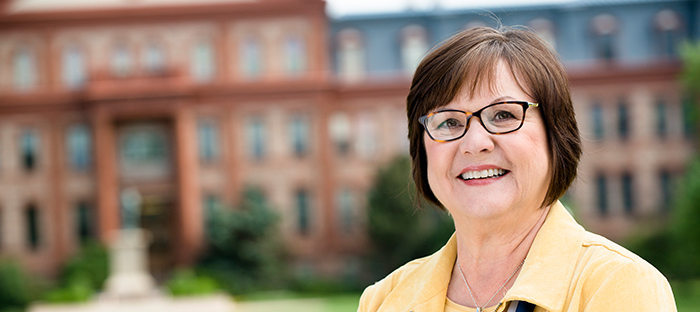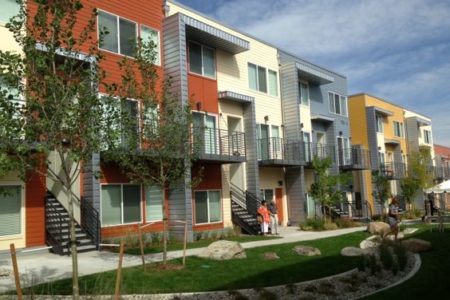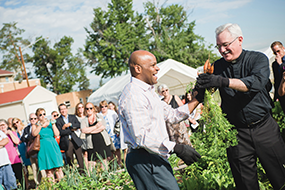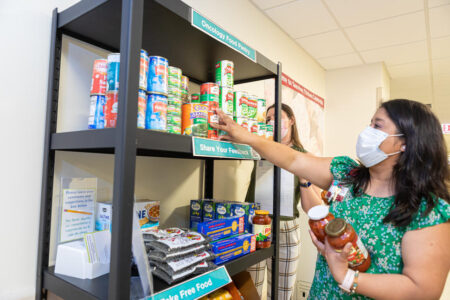Share On Social!
Dr. Janet Houser wants her Regis University in Denver to “make a difference in the world” for better health.

So they’ve started in their own backyard.
Houser, the university’s provost, is uniting community groups and developers to “cultivate health” in the neighborhood around the university—creating affordable housing and surrounding it with a health clinic, health education, and access to active spaces and healthy food.
In just a few years, they want to give local families a place where they can equitably live, learn, work, and play.
Is such a big transformation really possible?
A Rising Latino Population
Denver is one of the largest, fastest-growing cities in the country.
It also has a rising Latino population, from 23% in 1990 to 31% in 2014. This changing demographic compounds health equity issues in the area.
That includes Denver’s historic Regis Neighborhood, which includes Regis University.
The Regis Neighborhood is home to a diverse population of more than 14,000 people. More than 22% of people live in poverty. They struggle with affordable housing and options for healthy living.
Houser, who started as a professor of health professions at Regis University in 2009 before becoming provost a few years later, wanted to connect the university to the surrounding neighborhood as a way for the school and its students to make a difference.
“We knew we wanted to do something in [this area] of Denver,” Houser said. “It’s an area that has lacked in growth and development as opposed to the rest of the city.”
Fortunately, a new opportunity arose in 2014.
Cultivate Health: Places, People, Health
That year, Regis University won a $1 million grant from the Colorado Health Foundation to promote health and improve community connections.

The grant teamed the university with a private development team (Urban Ventures and Perry Rose) to “collectively impact health by building places, social connectivity, physical activities, improve access to food and health care.”
“We believe this unique mix will result in positive and lasting changes to this northwest Denver neighborhood,” said Susan Powers, President of Urban Ventures, in a news release. “We want this to be the model infill neighborhood in the country, an intentional neighborhood.”
The program aimed to:
- Work with Aria Denver, an apartment and townhouse project that began construction in 2013 and will eventually have 378 multi-family units.
- Boost access to active spaces—outdoor adult exercise equipment, a 3.7-mile wellness walk, and bike lanes.
- Boost access to healthy food—a one-acre garden that will supply fresh veggies to the neighborhood through a Pay-As-You-Can farm stand.
- Add preventive health measures—build a wellness clinic.
- Build healthy lifestyles education—nutrition and physical activity programs at Beach Court Elementary School.
“We hope to empower and equip our community toward healthier living through improved access to nutritional food and preventive health care,” Dr. Houser said.
Community Health Takes a Community
The results of Cultivate Health are bearing amazing fruit.

In August 2016, Regis University opened a free-standing wellness clinic to anyone living or working in the neighborhood. The facility, staffed by faculty and students, provides primary health care led by nurse practitioners, integrated physical and mental care, behavioral health and counseling services, a pharmacy, and health education and prevention.
“We try to look at the World Health Organization’s definition of health,” a clinic leader told 9news.com. “Which is looking at mind, body and social well-being, and not just when somebody’s sick. We’re really trying to help their health and the times when they’re also well.”
Groups like WalkDenver, UrbiCulture Community Farms, Trust for Public Land, and Bicycle Colorado have added healthy living infrastructure and/or programming to bolster health eating and active living components in the neighborhood. The project’s Facebook page continues to promote local wellness events and activities.
Houser is proud of what they’ve accomplished.
“It’s an exciting project,” said Dr. Houser. “We could not do it alone. We have over a dozen partners now assisting us, and we will continue to add more members to this Cultivate Health project in the future.”
Aria Denver has become a sustainable, healthy development. It’s one that engages neighbor with neighbor, encouraging biodiversity and education.
“We didn’t want a gated community. We didn’t want a Wal-Mart. We wanted a model of the neighborhoods we grew up in with a mix of rental, sale, and commercial mixed use,” Powers said. “In particular, we wanted to create a place of diversity that reflects the current neighborhoods.”
Ensuring that the community maintains its mix of income levels is a key component of the project.
“The project has been a complete success since opening last year,” Houser said. “We hope that this can serve as a model of what communities can do in the future. Universities can partner with businesses, local governments, other nonprofits, and the people who live here and everyone can have a say in a community’s health.”
Can your university partner with developers and community groups like this?
By The Numbers
25.1
percent
of Latinos remain without health insurance coverage
This success story was produced by Salud America! with support from the Robert Wood Johnson Foundation.
The stories are intended for educational and informative purposes. References to specific policymakers, individuals, schools, policies, or companies have been included solely to advance these purposes and do not constitute an endorsement, sponsorship, or recommendation. Stories are based on and told by real community members and are the opinions and views of the individuals whose stories are told. Organization and activities described were not supported by Salud America! or the Robert Wood Johnson Foundation and do not necessarily represent the views of Salud America! or the Robert Wood Johnson Foundation.



